八年级英语上册期末Unit 7 Will people have robots? 单元复习课件
文档属性
| 名称 | 八年级英语上册期末Unit 7 Will people have robots? 单元复习课件 | 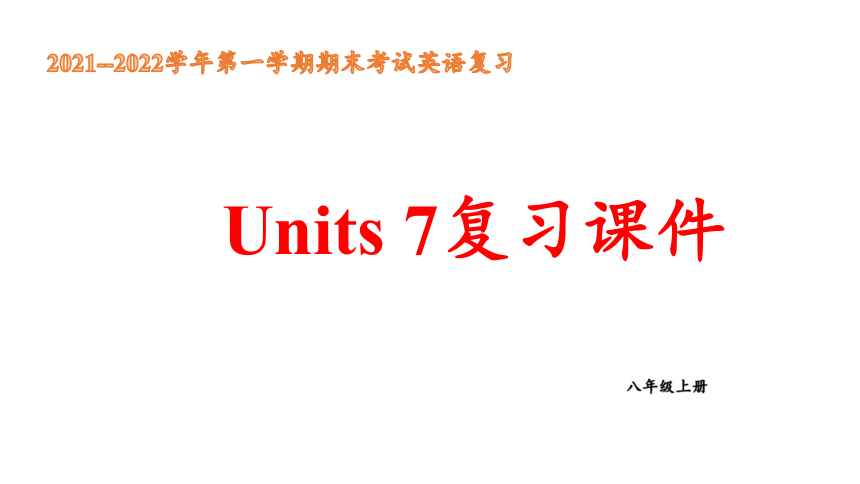 | |
| 格式 | zip | ||
| 文件大小 | 318.0KB | ||
| 资源类型 | 教案 | ||
| 版本资源 | 人教新目标(Go for it)版 | ||
| 科目 | 英语 | ||
| 更新时间 | 2022-01-02 20:32:29 | ||
图片预览


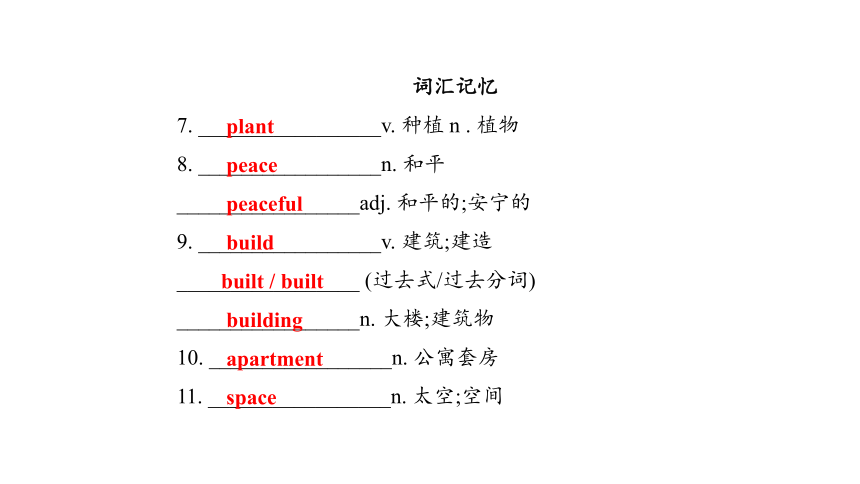
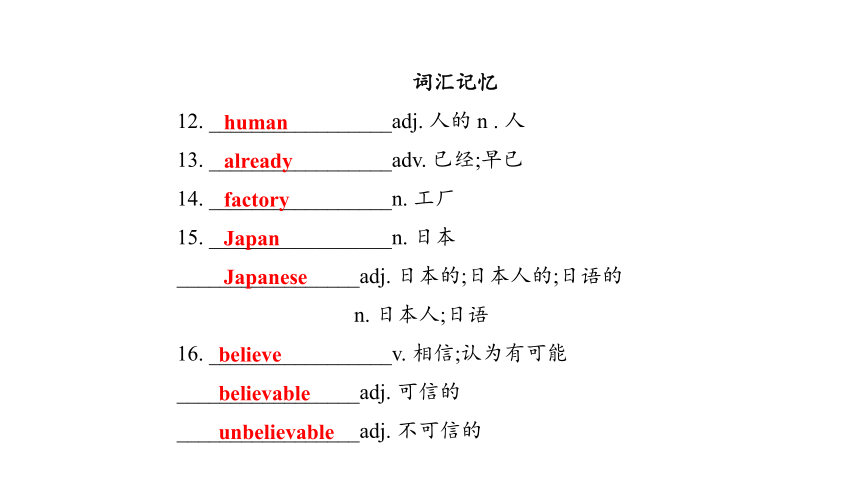
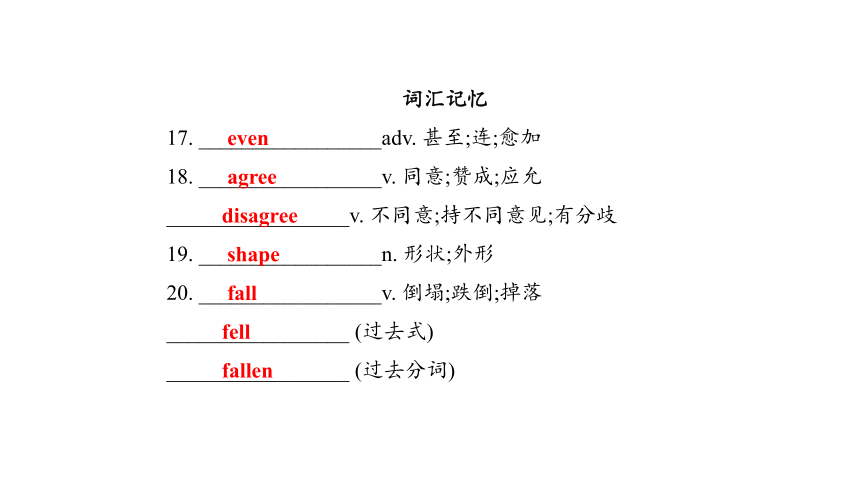

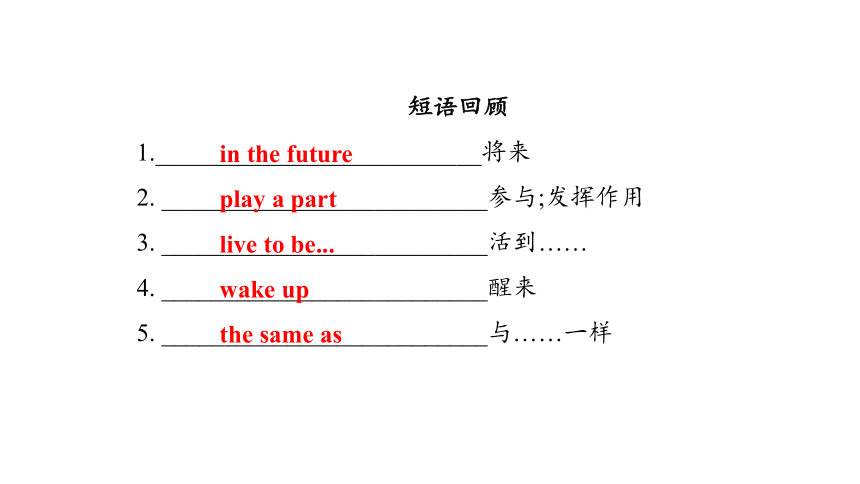
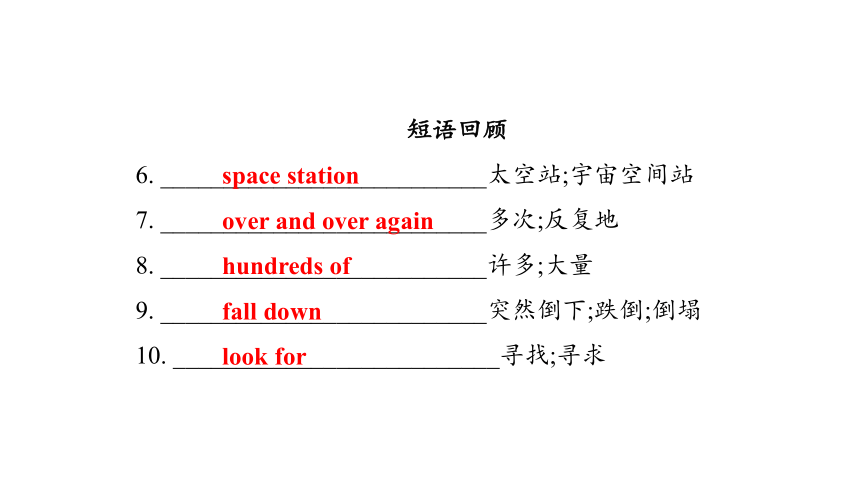
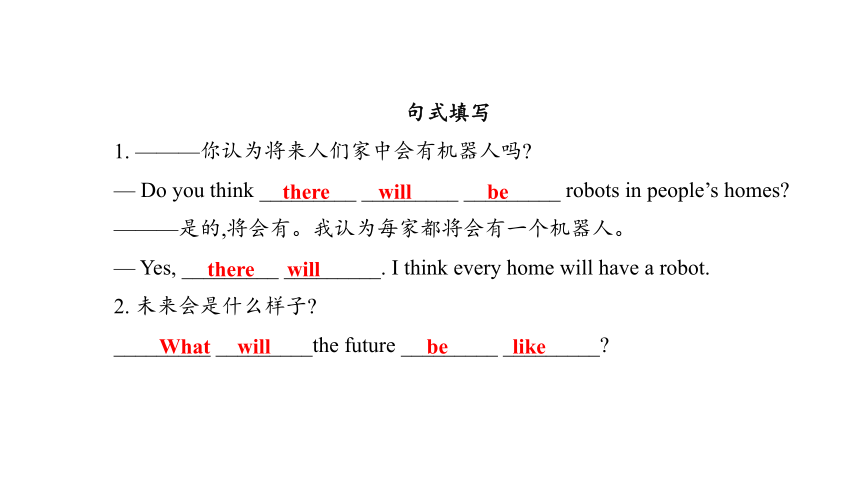
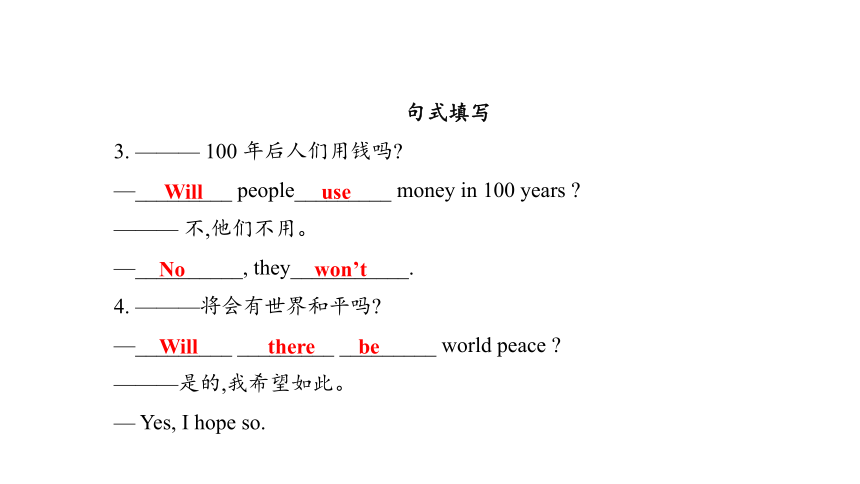
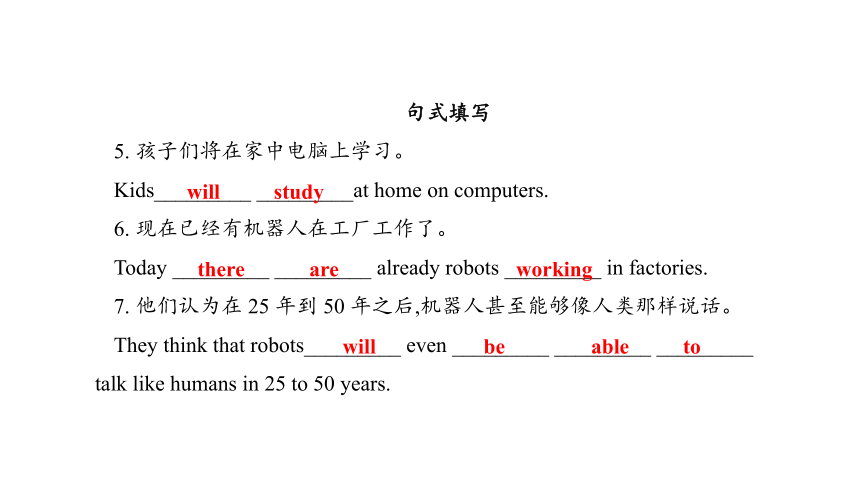
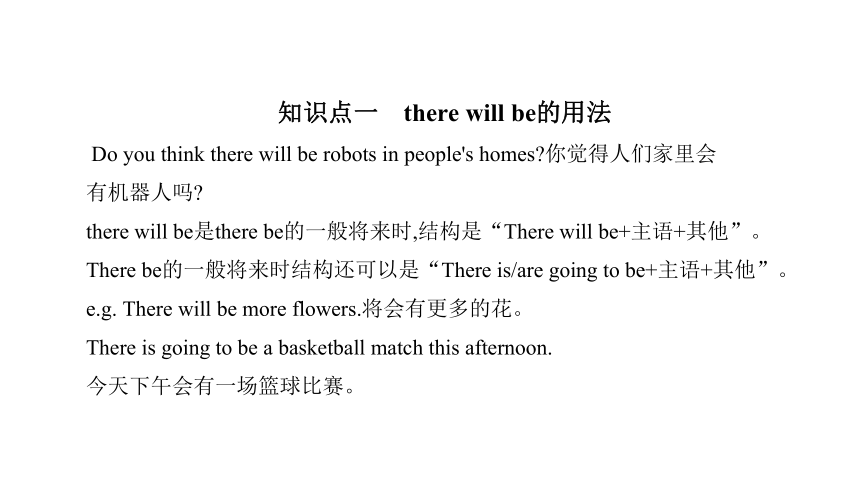
文档简介
(共37张PPT)
Units 7复习课件
八年级上册
2021--2022学年第一学期期末考试英语复习
词汇记忆
1._________________n. 纸;纸张
2. _________________v. 污染
_________________n. 污染;污染物
3. _________________n. 将来;未来
4. _________________n. 环境
_________________adj. 环境的
5. _________________n. 行星
6. _________________n. 地球;世界
paper
pollute
pollution
future
environment
environmental
planet
earth
词汇记忆
7. _________________v. 种植 n . 植物
8. _________________n. 和平
_________________adj. 和平的;安宁的
9. _________________v. 建筑;建造
_________________ (过去式/过去分词)
_________________n. 大楼;建筑物
10. _________________n. 公寓套房
11. _________________n. 太空;空间
plant
peace
peaceful
build
built / built
building
apartment
space
词汇记忆
12. _________________adj. 人的 n . 人
13. _________________adv. 已经;早已
14. _________________n. 工厂
15. _________________n. 日本
_________________adj. 日本的;日本人的;日语的
n. 日本人;日语
16. _________________v. 相信;认为有可能
_________________adj. 可信的
_________________adj. 不可信的
human
already
factory
Japan
Japanese
believe
believable
unbelievable
词汇记忆
17. _________________adv. 甚至;连;愈加
18. _________________v. 同意;赞成;应允
_________________v. 不同意;持不同意见;有分歧
19. _________________n. 形状;外形
20. _________________v. 倒塌;跌倒;掉落
_________________ (过去式)
_________________ (过去分词)
even
agree
disagree
shape
fall
fell
fallen
词汇记忆
21. _________________adv. & prep. 在……里面
22. _________________adj. 可能存在或发生的;可能的
_________________adj. 不可能的
23. _________________adv. 很可能;大概
24. _________________prep. 在……期间
25. _________________n. 假期;假日
inside
possible
impossible
probably
during
holiday
短语回顾
1.__________________________将来
2. __________________________参与;发挥作用
3. __________________________活到……
4. __________________________醒来
5. __________________________与……一样
in the future
play a part
live to be...
wake up
the same as
短语回顾
6. __________________________太空站;宇宙空间站
7. __________________________多次;反复地
8. __________________________许多;大量
9. __________________________突然倒下;跌倒;倒塌
10. __________________________寻找;寻求
space station
over and over again
hundreds of
fall down
look for
句式填写
1. ———你认为将来人们家中会有机器人吗
— Do you think _________ _________ _________ robots in people’s homes
———是的,将会有。我认为每家都将会有一个机器人。
— Yes, _________ _________. I think every home will have a robot.
2. 未来会是什么样子
_________ _________the future _________ _________
there will be
there will
What will be like
句式填写
3. ——— 100 年后人们用钱吗
—_________ people_________ money in 100 years
——— 不,他们不用。
—__________, they___________.
4. ———将会有世界和平吗
—_________ _________ _________ world peace
———是的,我希望如此。
— Yes, I hope so.
Will use
No won’t
Will there be
句式填写
5. 孩子们将在家中电脑上学习。
Kids_________ _________at home on computers.
6. 现在已经有机器人在工厂工作了。
Today _________ _________ already robots _________ in factories.
7. 他们认为在 25 年到 50 年之后,机器人甚至能够像人类那样说话。
They think that robots_________ even _________ _________ _________ talk like humans in 25 to 50 years.
will study
there are working
will be able to
知识点一 there will be的用法
Do you think there will be robots in people's homes 你觉得人们家里会
有机器人吗
there will be是there be的一般将来时,结构是“There will be+主语+其他”。
There be的一般将来时结构还可以是“There is/are going to be+主语+其他”。
e.g. There will be more flowers.将会有更多的花。
There is going to be a basketball match this afternoon.
今天下午会有一场篮球比赛。
There will be的句式变化有:
否定句 There will not/won't be+主语...
一般疑问句 Will there be+主语...
肯定答语 Yes,there will.
否定答语 No,there won't.
e.g.
There won't be more cars in the future.将来不会有更多的汽车。
—Will there be more cars in the future
将来会有更多的汽车吗
—Yes,there will.是的,会有。
—No,there won't.不,不会有。
The TV news reports that there a storm the day after tomorrow.
A.is B.was
C.will be D.has been
C
知识点二 “in+一段时间”的用法
Will people use money in 100 years 一百年后人们还会用钱吗
in 100 years意为“在一百年之后”。“in+一段时间”表示“在……(时间)之后”,常用于一般将来时的句子中,提问“in+表示一段时间的词”时用how soon或when。
e.g. —How soon/When will they return 他们过多久/什么时候返回
—In three weeks.三周后。
My father will be back in a week.我爸爸一周后回来。
知识拓展 辨析:in, after与later
in “in+时间段”表示“从现在开始算起的一段时间以后”,也可以表示“在将来多少时间之
内”。句中谓语动词通常用一般将来时。e.g. He will be back in two days. 他两天后回来。
after “after+一段时间”以过去为起点,表示过去一段时间以后,常用于过去时中。“after+具体时刻/具体事件”表示在某一具体时间点或某一具体事件以后,既可与过去时连用,也可用于将来时。e.g. He went home after two days. 他两天后回家了。
later later一般用于一段时间之后,即“一段时间+later”,相当于“after+一段时间”,多用于一般过去时。
e.g. Three years later, she went to Tsinghua University.
三年后,她上了清华大学。
—How soon will we get the offer from a new high school
— about two months.
A.In B.For
C.Among D.During
A
知识点三 play a part in的用法
Everyone should play a part in saving the earth.
每一个人都应当尽一份力来拯救地球。
play a part意为“参与(某事)”,play a part in doing sth.意为“参与做某事”。
play a part in还可以指“在……中起作用”,相当于play a role in。
part 前常加形容词来进行修饰,如leading、important、critical、active等。
e.g. She plays an active part in teaching these poor children.
她积极参加对这些贫穷孩子的教学工作。
—The haze(雾霾)weather is so serious. What should we do
—We should planting trees and driving less.
A.play a part in
B.look forward to
C.be halfway to
A
知识点四 disagree的用法
But many scientists disagree with Mr.White.
但是许多科学家不同意怀特先生(的观点)。
句中的disagree意为“不同意”,其反义词是agree。其用法如下:
用法 例句
disagree with sb. 不同意某人的观点 She disagrees with me.
她不同意我的观点。
disagree that... 不同意…… He disagrees that I go there.
他不同意我去那儿。
知识拓展
—I think we should take not only an umbrella but also a raincoat with us.
— . In my opinion, an umbrella is enough.
A.I'm OK B.I'm afraid not
C.I disagree D.You're welcome
C
知识点六 It+takes+时间+to do sth.的用法
However,they agree it may take hundreds of years.
然而,他们同意可能要花几百年的时间(才会有更多的机器人)的观点。
take意为“花费”,其主语常是it,代替后面的动词不定式(短语)。
常用句型:It takes/took/will take sb. some time to do sth.
意为“某人花费一段时间做某事”。
e.g. It took us half an hour to cook dinner.
做晚饭用了我们半个小时。
知识拓展 cost,spend,pay与take
It about eight minutes for the light to travel from the sun to the earth.
A.pays B.costs
C.spends D.takes
D
知识点七 hundreds of的用法
However,they agree it may take hundreds of years.然而,他们同意可能要
花几百年的时间(才会有更多的机器人)的观点。
hundreds of意为“许多;大量;好几百的”,修饰可数名词复数。类似用法的数词还有thousand、million等。具体用法如下:
(1)用单数的情况:当这些词与具体数字连用时,习惯上用单数,而且其后不接介词of。
e.g. I have two hundred and thirty-five books.我有235本书。
(2)用复数的情况:当这些词不与具体数字连用,而是表示不确定的数时,则不仅要用复数,后面还要接介词of,然后才能接名词。
e.g. There are hundreds of books on the desk.
桌子上有几百本书。
In our hometown, villagers leave for big cities to look for jobs.
A.two hundreds of B.hundred of
C.hundreds of D.two hundreds
C
一般将来时
一般将来时表示将来某个时间要发生的动作或存在的状态,也表示将来经常或反复发生的动作,常与表示将来的时间状语连用,
如tomorrow、next week、next year等。
e.g. I will go to my hometown next week.
下周我将去我的家乡。
1.“助动词will+动词原形”结构。will在名词或代词后常简缩为“'ll”,will not常简缩为won't。在疑问句中,主语为第一人称(I和we)时,常用助动词shall。
人称 肯定式 否定式 疑问式
第一人称 I/We will go. I/We will not go. Shall I/we go
第二人称 You will go. You will not go. Will you go
第三人称 He/She/It/They will go. He/She/It/They will not go. Will he/she/it/they go
一般将来时的构成:
2.“be going to+动词原形”表示将要发生的事或打算、计划、决定要做的事情。
e.g.
What are you going to do next Sunday
下周日你打算做什么
They're going to meet at the school gate.
他们打算在校门口见面。
注意:在下面几种情况下只可用shall/will表示将来,而不可用be going to结构。
①表示有礼貌地询问对方是否愿意或表示客气的邀请或命令时。
e.g. Will you please lend me your bike
请你把自行车借给我用一下好吗?
②表示意愿时。
如:I'll check this letter for you, if you want.
你要愿意,我会给你查查这封信的。
③表示单纯的将来,与人的主观愿望和判断无关时。
e.g. The sun will rise at 6:30 tomorrow morning.
明天早上太阳将在6:30升起。
(3) be doing表示将来
常用这种结构的动词有go,come,leave,stay,start,begin等,表示即将发生或安排好要做的事情。如:
We are leaving for London.我们就要动身去伦敦了。
She is going there tomorrow.她明天要去那里。
(4)“be about to+动词原形”和“be to+动词原形”结构表示即将发生的动作。
e.g. I was about to leave when the phone rang.
我刚要离开,这时电话响了。
(5)用一般现在时表示将来的情况
①表示按规定或时间表预计将发生的动作。
e.g. We're going to Changchun. Our plane takes off at 8:10.
我们打算去长春。我们的飞机8:10起飞。
②当主句为一般将来时态时,在if,as soon as,until,when等引导的状语从句中用一般现在时代替一般将来时。
e.g. If it doesn't rain this afternoon, we'll have a football match.
如果今天下午不下雨,我们将进行一场足球比赛。
1. —Let's go camping if it____________ next Saturday.
—But nobody knows if it ___________.
A. is fine; rains B. will be fine: rains
C. is fine: will rain D. will be fine: will rain
2.—The coffee’s finished!
—Oh, sorry! I ________to the shop to get some.
A. am going B. was going C. went D. have gone
C
A
Units 7复习课件
八年级上册
2021--2022学年第一学期期末考试英语复习
词汇记忆
1._________________n. 纸;纸张
2. _________________v. 污染
_________________n. 污染;污染物
3. _________________n. 将来;未来
4. _________________n. 环境
_________________adj. 环境的
5. _________________n. 行星
6. _________________n. 地球;世界
paper
pollute
pollution
future
environment
environmental
planet
earth
词汇记忆
7. _________________v. 种植 n . 植物
8. _________________n. 和平
_________________adj. 和平的;安宁的
9. _________________v. 建筑;建造
_________________ (过去式/过去分词)
_________________n. 大楼;建筑物
10. _________________n. 公寓套房
11. _________________n. 太空;空间
plant
peace
peaceful
build
built / built
building
apartment
space
词汇记忆
12. _________________adj. 人的 n . 人
13. _________________adv. 已经;早已
14. _________________n. 工厂
15. _________________n. 日本
_________________adj. 日本的;日本人的;日语的
n. 日本人;日语
16. _________________v. 相信;认为有可能
_________________adj. 可信的
_________________adj. 不可信的
human
already
factory
Japan
Japanese
believe
believable
unbelievable
词汇记忆
17. _________________adv. 甚至;连;愈加
18. _________________v. 同意;赞成;应允
_________________v. 不同意;持不同意见;有分歧
19. _________________n. 形状;外形
20. _________________v. 倒塌;跌倒;掉落
_________________ (过去式)
_________________ (过去分词)
even
agree
disagree
shape
fall
fell
fallen
词汇记忆
21. _________________adv. & prep. 在……里面
22. _________________adj. 可能存在或发生的;可能的
_________________adj. 不可能的
23. _________________adv. 很可能;大概
24. _________________prep. 在……期间
25. _________________n. 假期;假日
inside
possible
impossible
probably
during
holiday
短语回顾
1.__________________________将来
2. __________________________参与;发挥作用
3. __________________________活到……
4. __________________________醒来
5. __________________________与……一样
in the future
play a part
live to be...
wake up
the same as
短语回顾
6. __________________________太空站;宇宙空间站
7. __________________________多次;反复地
8. __________________________许多;大量
9. __________________________突然倒下;跌倒;倒塌
10. __________________________寻找;寻求
space station
over and over again
hundreds of
fall down
look for
句式填写
1. ———你认为将来人们家中会有机器人吗
— Do you think _________ _________ _________ robots in people’s homes
———是的,将会有。我认为每家都将会有一个机器人。
— Yes, _________ _________. I think every home will have a robot.
2. 未来会是什么样子
_________ _________the future _________ _________
there will be
there will
What will be like
句式填写
3. ——— 100 年后人们用钱吗
—_________ people_________ money in 100 years
——— 不,他们不用。
—__________, they___________.
4. ———将会有世界和平吗
—_________ _________ _________ world peace
———是的,我希望如此。
— Yes, I hope so.
Will use
No won’t
Will there be
句式填写
5. 孩子们将在家中电脑上学习。
Kids_________ _________at home on computers.
6. 现在已经有机器人在工厂工作了。
Today _________ _________ already robots _________ in factories.
7. 他们认为在 25 年到 50 年之后,机器人甚至能够像人类那样说话。
They think that robots_________ even _________ _________ _________ talk like humans in 25 to 50 years.
will study
there are working
will be able to
知识点一 there will be的用法
Do you think there will be robots in people's homes 你觉得人们家里会
有机器人吗
there will be是there be的一般将来时,结构是“There will be+主语+其他”。
There be的一般将来时结构还可以是“There is/are going to be+主语+其他”。
e.g. There will be more flowers.将会有更多的花。
There is going to be a basketball match this afternoon.
今天下午会有一场篮球比赛。
There will be的句式变化有:
否定句 There will not/won't be+主语...
一般疑问句 Will there be+主语...
肯定答语 Yes,there will.
否定答语 No,there won't.
e.g.
There won't be more cars in the future.将来不会有更多的汽车。
—Will there be more cars in the future
将来会有更多的汽车吗
—Yes,there will.是的,会有。
—No,there won't.不,不会有。
The TV news reports that there a storm the day after tomorrow.
A.is B.was
C.will be D.has been
C
知识点二 “in+一段时间”的用法
Will people use money in 100 years 一百年后人们还会用钱吗
in 100 years意为“在一百年之后”。“in+一段时间”表示“在……(时间)之后”,常用于一般将来时的句子中,提问“in+表示一段时间的词”时用how soon或when。
e.g. —How soon/When will they return 他们过多久/什么时候返回
—In three weeks.三周后。
My father will be back in a week.我爸爸一周后回来。
知识拓展 辨析:in, after与later
in “in+时间段”表示“从现在开始算起的一段时间以后”,也可以表示“在将来多少时间之
内”。句中谓语动词通常用一般将来时。e.g. He will be back in two days. 他两天后回来。
after “after+一段时间”以过去为起点,表示过去一段时间以后,常用于过去时中。“after+具体时刻/具体事件”表示在某一具体时间点或某一具体事件以后,既可与过去时连用,也可用于将来时。e.g. He went home after two days. 他两天后回家了。
later later一般用于一段时间之后,即“一段时间+later”,相当于“after+一段时间”,多用于一般过去时。
e.g. Three years later, she went to Tsinghua University.
三年后,她上了清华大学。
—How soon will we get the offer from a new high school
— about two months.
A.In B.For
C.Among D.During
A
知识点三 play a part in的用法
Everyone should play a part in saving the earth.
每一个人都应当尽一份力来拯救地球。
play a part意为“参与(某事)”,play a part in doing sth.意为“参与做某事”。
play a part in还可以指“在……中起作用”,相当于play a role in。
part 前常加形容词来进行修饰,如leading、important、critical、active等。
e.g. She plays an active part in teaching these poor children.
她积极参加对这些贫穷孩子的教学工作。
—The haze(雾霾)weather is so serious. What should we do
—We should planting trees and driving less.
A.play a part in
B.look forward to
C.be halfway to
A
知识点四 disagree的用法
But many scientists disagree with Mr.White.
但是许多科学家不同意怀特先生(的观点)。
句中的disagree意为“不同意”,其反义词是agree。其用法如下:
用法 例句
disagree with sb. 不同意某人的观点 She disagrees with me.
她不同意我的观点。
disagree that... 不同意…… He disagrees that I go there.
他不同意我去那儿。
知识拓展
—I think we should take not only an umbrella but also a raincoat with us.
— . In my opinion, an umbrella is enough.
A.I'm OK B.I'm afraid not
C.I disagree D.You're welcome
C
知识点六 It+takes+时间+to do sth.的用法
However,they agree it may take hundreds of years.
然而,他们同意可能要花几百年的时间(才会有更多的机器人)的观点。
take意为“花费”,其主语常是it,代替后面的动词不定式(短语)。
常用句型:It takes/took/will take sb. some time to do sth.
意为“某人花费一段时间做某事”。
e.g. It took us half an hour to cook dinner.
做晚饭用了我们半个小时。
知识拓展 cost,spend,pay与take
It about eight minutes for the light to travel from the sun to the earth.
A.pays B.costs
C.spends D.takes
D
知识点七 hundreds of的用法
However,they agree it may take hundreds of years.然而,他们同意可能要
花几百年的时间(才会有更多的机器人)的观点。
hundreds of意为“许多;大量;好几百的”,修饰可数名词复数。类似用法的数词还有thousand、million等。具体用法如下:
(1)用单数的情况:当这些词与具体数字连用时,习惯上用单数,而且其后不接介词of。
e.g. I have two hundred and thirty-five books.我有235本书。
(2)用复数的情况:当这些词不与具体数字连用,而是表示不确定的数时,则不仅要用复数,后面还要接介词of,然后才能接名词。
e.g. There are hundreds of books on the desk.
桌子上有几百本书。
In our hometown, villagers leave for big cities to look for jobs.
A.two hundreds of B.hundred of
C.hundreds of D.two hundreds
C
一般将来时
一般将来时表示将来某个时间要发生的动作或存在的状态,也表示将来经常或反复发生的动作,常与表示将来的时间状语连用,
如tomorrow、next week、next year等。
e.g. I will go to my hometown next week.
下周我将去我的家乡。
1.“助动词will+动词原形”结构。will在名词或代词后常简缩为“'ll”,will not常简缩为won't。在疑问句中,主语为第一人称(I和we)时,常用助动词shall。
人称 肯定式 否定式 疑问式
第一人称 I/We will go. I/We will not go. Shall I/we go
第二人称 You will go. You will not go. Will you go
第三人称 He/She/It/They will go. He/She/It/They will not go. Will he/she/it/they go
一般将来时的构成:
2.“be going to+动词原形”表示将要发生的事或打算、计划、决定要做的事情。
e.g.
What are you going to do next Sunday
下周日你打算做什么
They're going to meet at the school gate.
他们打算在校门口见面。
注意:在下面几种情况下只可用shall/will表示将来,而不可用be going to结构。
①表示有礼貌地询问对方是否愿意或表示客气的邀请或命令时。
e.g. Will you please lend me your bike
请你把自行车借给我用一下好吗?
②表示意愿时。
如:I'll check this letter for you, if you want.
你要愿意,我会给你查查这封信的。
③表示单纯的将来,与人的主观愿望和判断无关时。
e.g. The sun will rise at 6:30 tomorrow morning.
明天早上太阳将在6:30升起。
(3) be doing表示将来
常用这种结构的动词有go,come,leave,stay,start,begin等,表示即将发生或安排好要做的事情。如:
We are leaving for London.我们就要动身去伦敦了。
She is going there tomorrow.她明天要去那里。
(4)“be about to+动词原形”和“be to+动词原形”结构表示即将发生的动作。
e.g. I was about to leave when the phone rang.
我刚要离开,这时电话响了。
(5)用一般现在时表示将来的情况
①表示按规定或时间表预计将发生的动作。
e.g. We're going to Changchun. Our plane takes off at 8:10.
我们打算去长春。我们的飞机8:10起飞。
②当主句为一般将来时态时,在if,as soon as,until,when等引导的状语从句中用一般现在时代替一般将来时。
e.g. If it doesn't rain this afternoon, we'll have a football match.
如果今天下午不下雨,我们将进行一场足球比赛。
1. —Let's go camping if it____________ next Saturday.
—But nobody knows if it ___________.
A. is fine; rains B. will be fine: rains
C. is fine: will rain D. will be fine: will rain
2.—The coffee’s finished!
—Oh, sorry! I ________to the shop to get some.
A. am going B. was going C. went D. have gone
C
A
同课章节目录
- Unit 1 Where did you go on vacation?
- Section A
- Section B
- Unit 2 How often do you exercise?
- Section A
- Section B
- Unit 3 I'm more outgoing than my sister.
- Section A
- Section B
- Unit 4 What's the best movie theater?
- Section A
- Section B
- Unit 5 Do you want to watch a game show?
- Section A
- Section B
- Unit 6 I'm going to study computer science.
- Section A
- Section B
- Unit 7 Will people have robots?
- Section A
- Section B
- Unit 8 How do you make a banana milk shake?
- Section A
- Section B
- Unit 9 Can you come to my party?
- Section A
- Section B
- Unit 10 If you go to the party, you'll have a grea
- Section A
- Section B
